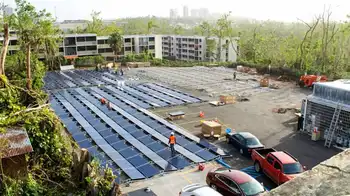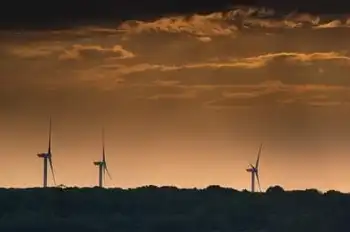Green energy a perfect incubator for legal conflict
By Globe and Mail
CSA Z463 Electrical Maintenance -
Our customized live online or in‑person group training can be delivered to your staff at your location.

- Live Online
- 6 hours Instructor-led
- Group Training Available
SkyPower filed for bankruptcy protection in August, after which a creditor was able to register construction liens against about 150 parcels of those properties.
Stantec Inc. STN-T , an engineering company that was owed about $242,000 by SkyPower, was simply trying to protect its claim against the wind developer, in order to preserve the right to sue for the value of the leases, said Stantec's lawyer Bryan Skolnik.
While an initial flurry of publicity in the local press suggested farmers might end up on the hook to pay Stantec, that isn't the case, Mr. Skolnik said: "We're not suing them, they're not defendants, and we're not looking for any relief from them."
Moreover, the liens should not affect the farmers' ability to borrow money against their properties or to sell the land - certainly no more than the contract with SkyPower limited that ability, Mr. Skolnik said.
The property owners were reassured by Stantec's clarification, and they hope that eventually the wind turbines will be built, by SkyPower or someone else. "This is a little hiccup that they are having along the way," said Lloyd Crowe, a partner in Reynolds Bros. Farms Ltd., a corn-and-bean operation in Picton, Ont., that is slated to get four turbines.
"The bottom line message for us is that [the liens] don't attach to the land or ourselves, so we're really not concerned," said his neighbour John Thompson.
Still, the experience of the farmers in Prince Edward County may be a cautionary tale for those getting directly involved with the green energy business. Legal disputes in the sector are likely to multiply, as fast and visible development of wind, solar and other technologies changes the landscape.
"The take-home message is that people have good reason to be cautious on a number of different levels when looking at [renewable] energy projects," said Eric Gillespie, a Toronto lawyer who specializes in environmental issues.
He is not convinced the Prince Edward Country situation is as benign as it appears, and thinks landowners who try to sell their land, or to borrow money using it as collateral, could run into problems because of the liens.
A broader problem, Mr. Gillespie said, is that Canada has a well-developed set of rules that kick in when property rights bump up against resource extraction, but the regulation of green industries is "evolving in most Canadian jurisdictions and is still a work in progress."
With wind power projects in particular, "you are basically dealing with electricity factories being installed in some of the more rural parts [of the country] that haven't seen industrialization on this kind of scale."
Mr. Gillespie has been involved in legal battles mounted by groups fighting against large-scale wind farm development. One of his clients, an Eastern Ontario farmer named Ian Hanna, recently applied for a judicial review of the province's Green Energy Act, asking that parts of the new law be put on hold until studies on the health effects of wind turbines are completed.
That kind of legal action will undoubtedly be duplicated elsewhere, said Dianne Saxe, an environmental lawyer based in Toronto. "There is all sorts of litigation we're going to see as wind energy and other forms of renewable energy spread - as there is with any new technology."
Ms. Saxe said some people fighting renewable projects base their arguments on the "precautionary principle," which suggests that a product or activity should be shown to be safe before it is approved. But the principle — adopted in several judicial decisions — does not mean governments need to have complete certainty before they take actions such as promoting green energy, she said. It merely says they need to take action if there is strong evidence of risks that falls short of certainty.
She noted that environmental disputes often arise for the same reasons there are conflicts in any other area of commerce. "In any area of business... there is a full range of misunderstandings and breaches of contracts and badly drafted contracts and alleged torts." Usually existing legal tools can deal with those, she said.
A key focus of conflicts in the green sector will likely involve the concept of "nuisance," Ms. Saxe said. "All of our environmental laws began in the law of nuisance, which [asks] 'How much interference must neighbours put up with from each other.' The question is how you balance those things."
As more individuals start generating power through solar panels or wind turbines on their properties, nuisance will become a central issue, she said.
But the concept of nuisance can also be invoked on larger-scale projects.
For example, even if a developer gets all the proper approvals and permits necessary and then builds a project, nuisance laws can force it to shut down at the very end of the process. That's an expensive and inefficient way to operate, Ms. Saxe said, yet a recent Supreme Court of Canada decision dealing with an existing cement plant in Quebec reinforced the principle.
By its very nature, the shift to a culture of renewable energy is a wrenching transformation, she said. Some people will benefit, and others will be disadvantaged, creating the perfect incubator for legal conflict.
Wind energy will likely be the focus for many of those disputes in the near term, she added, because it is the fastest growing renewable sector, the most visible, and one with specific concerns over health effects. "If you have those three factors, you are going to produce litigation."











